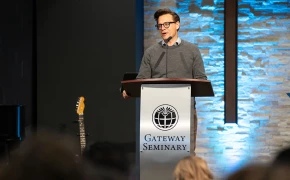GROZA: DAVID, MEPHIBOSHETH, AND GOD’S UNDESERVED KINDNESS IN CHRIST

Gateway President Adam Groza preached the gospel from the story of David and Mephibosheth during the first chapel of spring semester January 16, 2025.
January 21, 2025 (Ontario, Calif.) -- Gateway President Adam Groza preached the gospel from the story of David and Mephibosheth during the first chapel of spring semester January 16, 2025.
Groza’s sermon was on II Samuel 9, in which King David seeks out Mephibosheth, the son of Jonathan and grandson of Saul, in order to show him underserved kindness for the sake of Jonathan.
“I think that this is David's finest moment,” he said.
Groza described the historical context leading to this passage. God had granted David many victories and following his ascension to king, David began to search for Saul’s descendants. Rather than seeking to destroy Saul’s lineage, as was customary, David chose to care for Mephibosheth.
“Out of fear, leaders would kill, but we see in verse one and again in verse three of chapter nine, that David is led by love and not by fear,” Groza said.
“David is a godly leader; he uses his power to show kindness.”
Mephibosheth is described as being disabled in both his feet and he lived in Lo Debar, which means ‘no pasture.’ Mephibosheth, whose name is related to the word ‘shame’ describes himself as a dead dog before David. Yet, David invites Mephibosheth to eat at the king’s table.
“It is undeserved kindness based not on anything Mephibosheth did or could do, but entirely on someone else: Jonathan,” Groza said.
“David had a covenant with Jonathan… and David is honoring that covenant with Jonathan towards Mephibosheth.”
In verse 11, it says Mephibosheth eats at David’s table, like a son of the king.
“When we meet Mephibosheth, he's without honor, without family, without security. But when the story ends, he has a father, he has a family, he has a son, he has a legacy, his name will live on; it is a complete reversal, a complete restoration of all that was lost,” Groza said.
In his conclusion, Groza connected the passage to the gospel and implored leaders to use their position of authority to show kindness. Groza said that the story reminds us that “godly leadership will sometimes be countercultural . . . (Christian leaders) must not follow blindly the leadership methods of the world.”
“The story of David and Mephibosheth is a picture of the gospel,” he said.
“Because of God’s saving kindness for the sake of Jesus we are adopted as sons, we reap what we do not sow, we inherit a kingdom that we did not build, we have a new name, and we are carried to the table forever.”
“Let’s take all that God has given us and show the kindness of Jesus, the kindness we have been shown, to others.”
--30--
